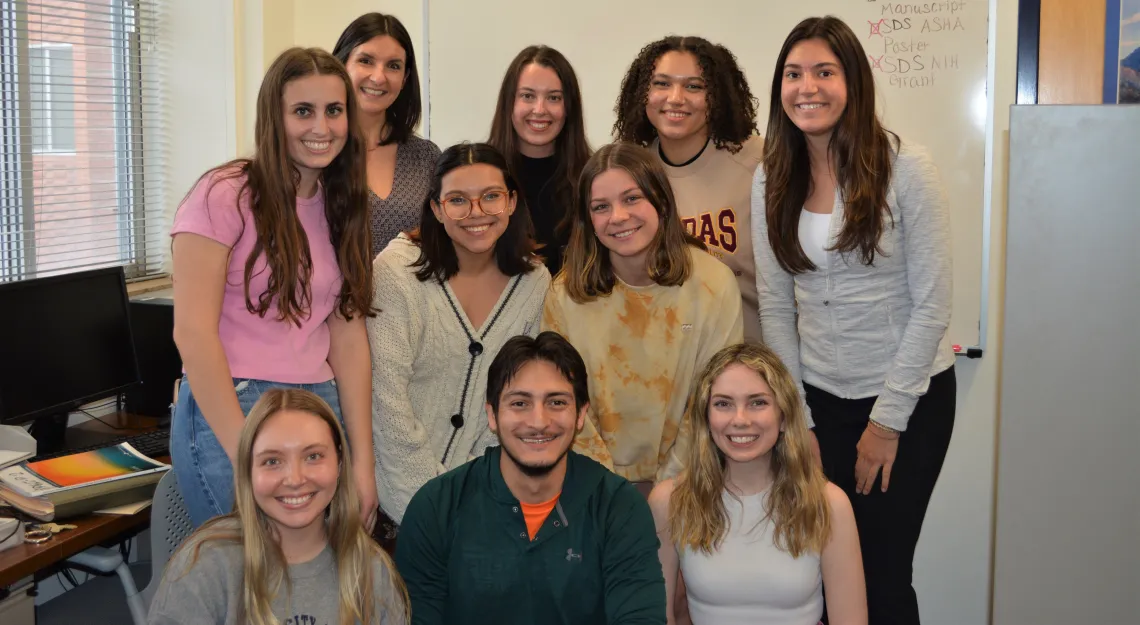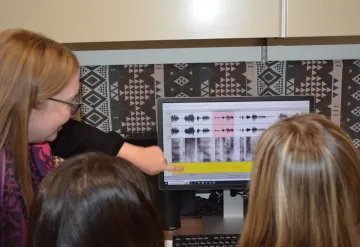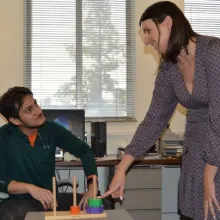
Our faculty members work closely with undergraduate and graduate-level students on a wide variety of research topics related to human communication and its disorders. Through a range of research experiences, our students have a unique opportunity to explore the boundaries of what is currently known on how we hear, perceive, produce, and understand speech and language. Our students investigate innovative ways to assess and treat individuals with communication disorders in a dynamic and collaborative setting. Many students become co-authors of peer-reviewed publications. See publications with student co-authors.
Research Labs in SLHS
Students have a unique opportunity to get involved and assist in the innovation and discovery happening at the University of Arizona. We encourage students at both the undergraduate and graduate levels to engage with research.
Speech, Language, and Hearing Sciences is a leader in innovative language, hearing, and speech research. The work of our faculty covers the spectrum of basic science, translational research, clinical research, and intervention studies. Our faculty engages in multi-disciplinary research addressing a wide range of topics, speech acoustics and perception; speech motor control in normal and disordered humans; voice production and disorders; language development and disorders; language and cognition; language development and disorders associated with genetic conditions such as fragile X syndrome; language development in children with autism; literacy; bilingual language development; speech and language development in children with cerebral palsy; neural imaging; auditory rehabilitation; auditory perception and amplification; vestibular research.
If you are interested in joining a lab, contact the lab’s principal investigator (PI) or lab manager to determine if they are taking on new students and, if so, how their application process works. Note that students can volunteer with a lab, earn course credit, or be employed with a lab as a student hourly.
FUERZA Program
Interested in having the opportunity to participate in an SLHS research lab for a paid rotation? Apply to be a FUERZA Student!
During your rotation, you will learn about research and identify mentoring goals with your mentor. You will take part in mentoring activities outside your home lab (e.g., applying to graduate school; and learning about research as a career) and be part of the FUERZA cohort.
Below is a description of our labs, personnel, and some current or previous research activities.
Director: Nicole Marrone, PhD, CCC-A
Key Personnel: Bryan Wong, PhD, AuD, CCC-SLP
Location: Rooms 403, 109 (soundfield), and 207
In the Audiologic Rehabilitation Lab, our research seeks to improve quality of life and quality of care for adults living with hearing loss, with an emphasis on health equity. We take an ecological and biopsychosocial approach to the study of communication. We are interested in the links between auditory and cognitive abilities that affect communication when using hearing aids, outcomes of rehabilitative interventions, and how changes in hearing impact daily life for individuals and their families. Our research group includes undergraduates, graduate students, and clinical faculty collaborators from the University of Arizona Hearing Clinics. Our NIH-funded research seeks to reduce disparities in access to hearing health care in collaboration with faculty and community members in public health, psychology, Spanish, and translation studies (“Oyendo Bien” or Hearing Well). Our lab members also lead several community-engaged outreach projects including: UA Living Well with Hearing Loss program, The Protect Your Ears Project (an afterschool hearing conservation program), Viviendo Bien con Pérdida Auditiva (Spanish-language peer support), and the Living Well with Hearing Loss community lecture series.
Director: David Velenovsky, PhD, CCC-A
Location: SLHS Rooms 226 and 230
Members of the “Reflectance Lab” have diverse research interests including studies exploring pupilometry as a measure of cognitive load, auditory information processing, the effects of high noise levels on hearing as well as acoustic reflex measures using wideband power reflectance and transmittance. Beyond the goal of pursuing research that contributes to a better understanding of human auditory function, we also strive to increase interest in hearing and hearing science among undergraduate and graduate students.
Director: Genesis Arizmendi, PhD, CCC-SLP
Location: SLHS Room 310
Lab Website: BABEL Lab
Work in the BABEL Lab aims to mitigate disparities and advance equity within the educational and healthcare systems. Dr. Arizmendi examines the intersection of cognition, language, and academic achievement in bilingual children with diverse learning profiles, spanning typical development, developmental language disorder, and difficulties with mathematics and reading. To better understand these relationships, research in the lab further explores the influence of policy and social context on educational outcomes.

Director: Meghan Darling-White, PhD, CCC-SLP
Location: Rooms 301 and 530
Lab personnel: Trianna Oglivie, PhD, CCC-SLP
The long-term goal of the P.A.L.S. lab is to develop and validate evidence-based interventions that improve speech production skills in people with motor speech disorders. To address this goal, our lab uses a combination of kinematic, aerodynamic, acoustic and perceptual analyses to examine how physiologic changes to the speech subsystems (e.g., respiratory, phonatory, articulatory) impact speech intelligibility and naturalness. Our current work focuses on respiratory function during speech production in children with cerebral palsy.
Communication P.A.L.S. Lab website: Home | Communication P.A.L.S. Lab

Director: Leah Kapa, PhD
Student Researchers: Abby Williams, Diego Melendez, Allison Staib, Sierra Teso, Maddie Conway, and Kate Alpert
Location: Room 334
The Language and Cognition Lab focuses on the interaction between language and cognitive abilities, with a specific focus on executive functioning (e.g., memory, attention, planning), in individuals with typical and disordered language development. We address questions about the effects of self-directed language on executive function performance, the potential contribution of executive function skills to the process of language learning, and the effectiveness of executive function intervention programs for improving cognitive and/or language abilities in children.
Director: Mary Alt, PhD, CCC-SLP
Key Personnel: Cecilia Figueroa, MS, CCC-SLP (Project Director); Nora Evans-Reitz, MS, CCC-SLP (Project Director)
Post-Docs: Heidi Mettler, PhD, CCC-SLP and Alyssa Sachs, PhD, CCC-SLP
Location: Rooms 322/324
Links: L4 Lab website
The L4 Lab’s research is centered on answering this question: How do people learn words and the concepts associated with those words? The answers to this question are fundamental to our understanding of language development and disorders of language and learning. We examine the cognitive underpinnings of language learning (e.g., working memory), investigate how we can apply principles of statistical learning to word learning treatments, and explore learning in different populations including bilingual learners, late talkers, children with developmental language disorder, and dyslexia. We are interested in extending findings from our lab into clinically-driven research and in partnering with the community to engage in implementation science.
Director: Aneta Kielar, PhD
Location: Room 332
Collaborators: Pelagie Beeson, Vicky Lai, and Steven Rapcsak
Postdoctoral Fellow: Katlyn Nickels, PhD
Student Researchers: Fatima Jebahi, Noah Frazier, Emily Abraham
The Language and Neuroimaging Research Lab explores neural correlates of language processing. We use a combination of structural and functional neuroimaging techniques to understand how neural dynamics are impacted by stroke, neurodegenerative disorders and aging. We are interested in recovery of function, and treatment approaches involving speech-language therapy in combination with noninvasive brain stimulation techniques, such as transcranial magnetic stimulation (TMS), and transcranial direct current stimulation (tDCS).
Dr. Kielar's website: sites.arizona.edu/anetakielar
Director: Nell Maltman, PhD
Location: Room 506
Lab Website: https://sites.google.com/view/lifespanlanguagelab/home
The Lifespan Language Lab is dedicated to understanding the links between language, genetics, and cognition across the lifespan among families affected by fragile X-associated conditions and autism spectrum disorder. We are particularly interested in the FMR1 gene, executive functioning, aging, caregiving, and stress as key factors that contribute to language use. By investigating these links, we hope to inform practices that help maximize the quality of life for those affected by such conditions.
Director: Elena Plante, PhD, CCC-SLP
Key Personnel: Rebecca Vance, MS, CCC-SLP
Location: Room 334
Current work in Dr. Plante’s lab focuses on learning and assessment. The lab is focused on children and adults with developmental language disorder. Behavioral studies are designed to determine what conditions facilitate rapid learning and whether those with language impairment benefit from the same factors that facilitate learning for non-impaired individuals. Findings from these studies are then incorporated into treatment studies (summers) designed to make language treatment faster and more effective. The lab is also involved in the process of developing new methods to assess language and literacy skills intended for clinical use.
Directors: Brad Story, PhD, and Kate Bunton, PhD, CCC-SLP
Location: Room 307
Links: Speech Acoustics and Physiology Lab website
Research in the Speech Acoustics Laboratory is focused on the following areas: speech acoustics and articulation (kinematics) related to speech production, measures of velopharyngeal function, speech simulation, and volumetric imaging of the vocal tract. Computerized models are used in our laboratory in conjunction with perceptual experiments to aid in understanding how the physical shapes and sizes of both the voice source components and the vocal tract contribute to the sound of the human voice and perception of speech.
Director: Megan Kobel, AuD, PhD
Location: SLHS 519
Research in the Vestibular Research Lab explores novel methods to characterize vestibular function. The long-term goal of this work is to improve diagnosis and management of those experiencing vertigo, dizziness, and imbalance. We use a combination of tools including vestibular perceptual assessments, balance and gait evaluations, eye-tracking, and evoked potentials.
Director: Robin Samlan, PhD, CCC-SLP
Other Personnel: Dori Smith, DMA, MS, CCC-SLP; Natalie Monahan, MS, CCC-SLP
Location: Room 301
Our long-term goal in the Voice Lab is to improve the diagnosis and treatment of breathy voice disorders, particularly the breathy/weak voices associated with age-related dysphonia, vocal fold paralysis, and Parkinson disease. We use tools such as laryngeal high-speed video of vocal fold vibration, acoustic and aerodynamic studies, computational modeling, and listening studies in our work.
Student Roles: Data collection and measurement
Pre-requisites: Minimum grade of B in Anatomy, Physiology, and Acoustics
Currently accepting students? No
Director: Julie E. Miller, PhD
Location: Gould Simpson, Room 421 main lab
Key Personnel: Reed Bjork (Neuroscience PhD student); Undergraduates Sydrah Damir (NSCS major), Michelle Gordon (MCB major), Famesh Patel (NSCS major), Arpita Gulati (NSCS major), and Madeleine Daly (NSCS major)
Lab Website: https://sites.arizona.edu/julieemiller-lab/
Lab Product: https://sites.arizona.edu/julieemiller-lab/publications-abstracts/
Work in the WINGSS laboratory focuses on the identification and characterization of molecular and cellular pathways in the brain that support speech mechanisms particularly the impact of normative aging and Parkinson's disease. We carry out these investigations in the zebra finch songbird model which shares a number of similarities to human vocal learning and production. Methods include a combination of behavioral, molecular, biochemical, electrophysiological and bioinformatic approaches that enable us to link changes at the molecular/cellular levels to alterations in neural circuits for song behavior.
Pre-requisites: None
Preferences: First years or sophomores
Currently accepting students? No
Contact: Dr. Julie E. Miller juliemiller@arizona.edu

